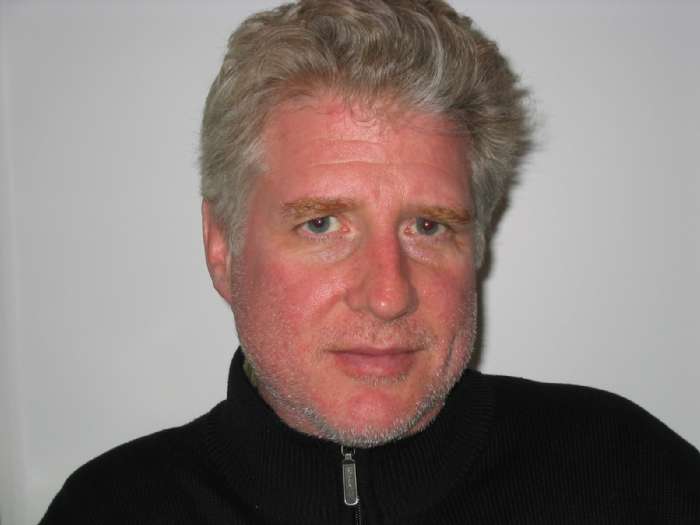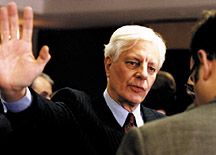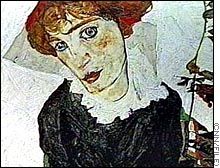National Public Radio made a huge mistake ousting its veteran
arts reporter David D’Arcy and is still trying to cover it up. The latest
attempt came during an investigation by the National Labor Relations Board when the network
refused to produce documents that would allegedly clarify why he was fired and Tom Cole, a
unionized NPR staff editor who supervised the story, was disciplined.
 D’Arcy, left, who freelanced for NPR for 21 years, was fired in January
D’Arcy, left, who freelanced for NPR for 21 years, was fired in January
after the Museum of Modern Art complained about a story he did exposing the museum’s
involvement in a case of Holocaust art theft (the Egon Shiele painting “Portrait of Wally”) and
pointing out the contradictory stands on Nazi-looted art restitution expressed by both MoMA and
its billionaire board chairman Ronald Lauder, who also happens to collect Shiele paintings.
In addition to firing D’Arcy, NPR ran a “correction” to the story that
experts on the restitution of Nazi-looted art say is misleading and brazenly inaccurate, not to
mention damaging to D’Arcy’s reputation for thorough, in-depth reporting on the issue of
Holocaust art theft.
“NPR failed to provide documentation about mysterious activities on this matter, which they
say is confidential,” says Ken Greene, who sought the NLRB investigation as a union official of
the American Federation of Television and Radio Artist’s Baltimore-Washington chapter. “They
cited attorney-client privilege for information we requested. We say this information was not
between attorneys and clients but between managers.”
The “mysterious activities” involve “what happened during three weeks, from Jan. 6 to 27,”
he said. That is around the time MoMA is alleged to have brought pressure on NPR in phone calls
and other communications with NPR President and CEO Kevin Klose and NPR news executives.
“They never asserted attorney-client privilege about this information until the NLRB
investigation,” Greene added. “But the union expects the information to be disclosed when we
subpoena witnesses for an
The NLRB investigation was dismissed, and NPR avoided the charge of unfair labor
practices. The best prospect for sorting out the mystery, it now seems, should come at the
hearing, which has been tentatively scheduled for several alternative dates in July, Greene
says.
Another source, who asked not to be identified, confirms that NPR “didn’t want to produce
certain documents they say is privileged because of possible litigation against NPR by D’Arcy.”
It’s worth noting, however, that D’Arcy has not sued NPR, has never threatened to do so and,
according to a third source, would be reluctant to take that course of action.
 These documents, sources tell me, would show that MoMA threatened
These documents, sources tell me, would show that MoMA threatened
by fax, phone, e-mail and/or letter not to cooperate with NPR reporters on future stories if it did
not repudiate D’Arcy’s piece, even though nobody at NPR — including Klose, left, who was
directly contacted by MoMA, according to a source — had ever claimed D’Arcy’s report was
factually inaccurate.
Further, D’Arcy has sworn in an affidavit for the union’s arbritration hearing that in the first
week of January, after his story aired but before MoMA began applying pressure to top NPR
executives, NPR assistant managing editor Bill Wyman praised it. “He told me, ‘This is just the
kind of journalism I want the culture desk to be doing.’ He told me that. At no time during the
preparation of the story or during the editing was any criticism raised about the way I went about
reporting it.”
The reason for firing D’Arcy, as it now stands, is not inaccurate reporting. It’s that he violated
NPR’s ethical standards for failing to report the story in a “fair and balanced” way. In a
conversation with NPR management, D’Arcy was accused of “making Ronald Lauder look like a
hypocrite … and MoMA’s trustees look like bad Jews.”
If you read the transcript of D’Arcy’s report, broadcast on Dec. 27, you’ll see it says, “At
MoMA’s opening last month, Lauder talked about guidelines for institutions and collectors.” If
you listen to the report, you hear the ambient noise of the opening. Lauder was at the opening and
took questions from the press. D’Arcy asked Lauder, one-on-one, what should happen to art
identified as objects seized by the Nazis, which had not been returned. Lauder said it should go
back to the families who had owned it.
“That was the question, that was the answer,” D’Arcy recalls. “Lauder also said he thought
MoMA was doing a better job of looking into its collection [for looted art] than other museums in
Europe had done. We talked quite a bit about collecting art from Middle Europe. I got a general
statement about MoMA policy from its chairman and sought to clarify their implementation of the
policy with MoMA’s legal counsel.”
 Yet MoMA has argued in court that the Schiele painting in
Yet MoMA has argued in court that the Schiele painting in
question, “Portrait of Wally,” right, which was Aryanized from Jews who feared for their lives in
1939, is no longer legally stolen and, therefore, their heirs have no legal basis for a claim to
ownership either in the United States or in Austria. “Wally” was on loan to MoMA in 1997 from
the Leopold Foundation in Vienna when heirs of Lea Bondi Jaray — from whom “Wally” was
stolen — spotted the picture and asked the museum not to ship it out of the country so they could
eventually reclaim it. The museum insists it is bound by a loan contract to return “Wally” to the
lender.
As to the allegation in NPR’s posted “correction” that he did not allow MoMA to reply to
critical comments, D’Arcy says: “That’s ridiculous. Moma knew what it didn’t want to talk about
and declined to comment, in writing. MoMA knows this better than anyone. Its awareness of the
public relations risk in trying to explain a conflicted position in the Schiele case may account for
its refusal to talk with other reporters besides me, like Morley Safer of CBS News and Marilyn
Henry of ArtNews.”
And D’Arcy adds, “while I was preparing the story, an NPR editor sat in on at least two of
the interviews in which critics characterized MoMA’s activities. The editors knew the nature of
the criticism being directed at MoMA in this case. These criticisms had been raised for the past
seven years.”




